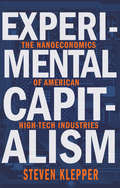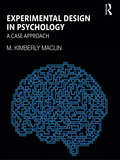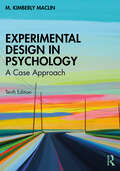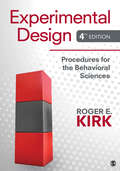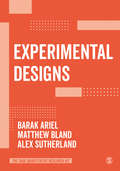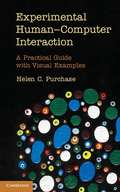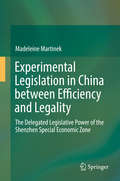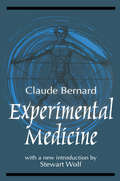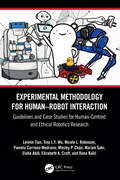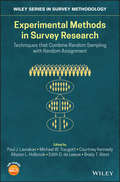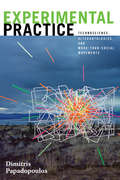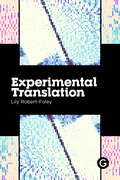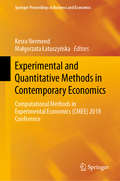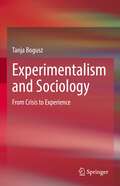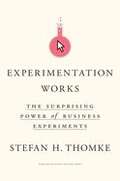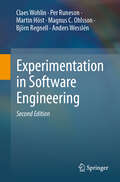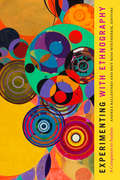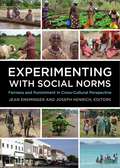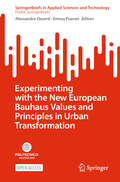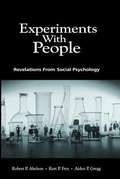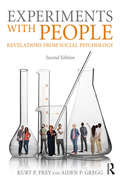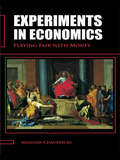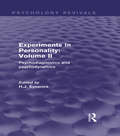- Table View
- List View
Experimental Capitalism
by John H. Miller Steven Klepper Serguey Braguinsky David A. HounshellFor much of the twentieth century, American corporations led the world in terms of technological progress. Why did certain industries have such great success? Experimental Capitalism examines six key industries--automobiles, pneumatic tires, television receivers, semiconductors, lasers, and penicillin--and tracks the highs and lows of American high-tech capitalism and the resulting innovation landscape. Employing "nanoeconomics"--a deep dive into the formation and functioning of companies--Steven Klepper determines how specific companies emerged to become the undisputed leaders that altered the course of their industry's evolution.Klepper delves into why a small number of firms came to dominate their industries for many years after an initial period of tumult, including General Motors, Firestone, and Intel. Even though capitalism is built on the idea of competition among many, he shows how the innovation process naturally led to such dominance. Klepper explores how this domination influenced the search for further innovations. He also considers why industries cluster in specific geographical areas, such as semiconductors in northern California, cars in Detroit, and tires in Akron. He finds that early leading firms serve as involuntary training grounds for the next generation of entrepreneurs who spin off new firms into the surrounding region. Klepper concludes his study with a discussion of the impact of government and the potential for policy to enhance a nation's high-tech industrial base.A culmination of a lifetime of research and thought, Experimental Capitalism takes a dynamic look at how new ideas and innovations led to America's economic primacy.
Experimental Design in Psychology: A Case Approach
by M. Kimberly MacLinThis text is about doing science and the active process of reading, learning, thinking, generating ideas, designing experiments, and the logistics surrounding each step of the research process. In easy-to-read, conversational language, Kim MacLin teaches students experimental design principles and techniques using a tutorial approach in which students read, critique, and analyze over 75 actual experiments from every major area of psychology. She provides them with real-world information about how science in psychology is conducted and how they can participate. Recognizing that students come to an experimental design course with their own interests and perspectives, MacLin covers many subdisciplines of psychology throughout the text, including IO psychology, child psychology, social psychology, behavioral psychology, cognitive psychology, clinical psychology, health psychology, educational/school psychology, legal psychology, and personality psychology, among others. Part I of the text is content oriented and provides an overview of the principles of experimental design. Part II contains annotated research articles for students to read and analyze. Classic articles have been retained and 11 new ones have been added, featuring contemporary case studies, information on the Open Science movement, expanded coverage on ethics in research, and a greater focus on becoming a better writer, clarity and precision in writing, and reducing bias in language. This edition is up to date with the latest APA Publication Manual (7th edition) and includes an overview of the updated bias-free language guidelines, the use of singular "they," the new ethical compliance checklist, and other key changes in APA style. This text is essential reading for students and researchers interested in and studying experimental design in psychology.
Experimental Design in Psychology: A Case Approach
by M. Kimberly MacLinThis text is about doing science and the active process of reading, learning, thinking, generating ideas, designing experiments, and the logistics surrounding each step of the research process. In easy-to-read, conversational language, Kim MacLin teaches students experimental design principles and techniques using a tutorial approach in which students read, critique, and analyze over 75 actual experiments from every major area of psychology. She provides them with real-world information about how science in psychology is conducted and how they can participate. Recognizing that students come to an experimental design course with their own interests and perspectives, MacLin covers many subdisciplines of psychology throughout the text, including IO psychology, child psychology, social psychology, behavioral psychology, cognitive psychology, clinical psychology, health psychology, educational/school psychology, legal psychology, and personality psychology, among others. Part I of the text is content oriented and provides an overview of the principles of experimental design. Part II contains annotated research articles for students to read and analyze. New sections on how to critically evaluate media reports of scientific findings (in other words, how to identify ‘fake news’), authorship guidelines and decisions, survey research methods and AI tools have been included. Further, expanded information on the Open Science movement, and on ethics in research, and methods to achieve clarity and precision in thinking and writing are included. This edition is up to date with the latest APA Publication Manual (7th edition) and includes an overview of the bias-free language guidelines, the use of singular "they," and an ethical compliance checklist.. This text is essential reading for students and researchers interested in and studying experimental design in psychology.
Experimental Design in Psychology: A Case Approach
by M. Kimberly MacLinThis text is about doing science and the active process of reading, learning, thinking, generating ideas, designing experiments, and the logistics surrounding each step of the research process. In easy-to-read, conversational language, Kim MacLin teaches students experimental design principles and techniques using a tutorial approach in which students read, critique, and analyze over 75 actual experiments from every major area of psychology. She provides them with real-world information about how science in psychology is conducted and how they can participate.Recognizing that students come to an experimental design course with their own interests and perspectives, MacLin covers many subdisciplines of psychology throughout the text, including IO psychology, child psychology, social psychology, behavioral psychology, cognitive psychology, clinical psychology, health psychology, educational/school psychology, legal psychology, and personality psychology, among others. Part I of the text is content oriented and provides an overview of the principles of experimental design. Part II contains annotated research articles for students to read and analyze.New sections on how to critically evaluate media reports of scientific findings (in other words, how to identify ‘fake news’), authorship guidelines and decisions, survey research methods and AI tools have been included. Further, expanded information on the Open Science movement, and on ethics in research, and methods to achieve clarity and precision in thinking and writing are included.This edition is up to date with the latest APA Publication Manual (7th edition) and includes an overview of the bias-free language guidelines, the use of singular "they," and an ethical compliance checklist.. This text is essential reading for students and researchers interested in and studying experimental design in psychology.
Experimental Design: Procedures for the Behavioral Sciences (4th Edition)
by Roger E. KirkExperimental Design: Procedures for Behavioral Sciences, Fourth Edition is a classic text with a reputuation for accessibility and readability. It has been revised and updated to make learning design concepts even easier. Roger E. Kirk shows how three simple experimental designs can be combined to form a variety of complex designs. He provides diagrams illustrating how subjects are assigned to treatments and treatment combinations. New terms are emphasized in boldface type, there are summaries of the advantages and disadvantages of each design, and real-life examples show how the designs are used.
Experimental Designs (The SAGE Quantitative Research Kit)
by Alex Sutherland Barak Ariel Matthew P. BlandThe fourth book in The SAGE Quantitative Research Kit, this resource covers the basics of designing and conducting basic experiments, outlining the various types of experimental designs available to researchers, while providing step-by-step guidance on how to conduct your own experiment. As well as an in-depth discussion of Random Controlled Trials (RCTs), this text highlights effective alternatives to this method and includes practical steps on how to successfully adopt them. Topics include: · The advantages of randomisation · How to avoid common design pitfalls that reduce the validity of experiments · How to maintain controlled settings and pilot tests · How to conduct quasi-experiments when RCTs are not an option Practical and succintly written, this book will give you the know-how and confidence needed to succeed on your quantitative research journey.
Experimental Designs (The SAGE Quantitative Research Kit)
by Alex Sutherland Barak Ariel Matthew P. BlandThe fourth book in The SAGE Quantitative Research Kit, this resource covers the basics of designing and conducting basic experiments, outlining the various types of experimental designs available to researchers, while providing step-by-step guidance on how to conduct your own experiment. As well as an in-depth discussion of Random Controlled Trials (RCTs), this text highlights effective alternatives to this method and includes practical steps on how to successfully adopt them. Topics include: · The advantages of randomisation · How to avoid common design pitfalls that reduce the validity of experiments · How to maintain controlled settings and pilot tests · How to conduct quasi-experiments when RCTs are not an option Practical and succintly written, this book will give you the know-how and confidence needed to succeed on your quantitative research journey.
Experimental Human-Computer Interaction
by Helen C. PurchaseExperiments that require the use of human participants are time consuming and costly: it is important to get the process right the first time. Planning and preparation are key to success. This practical book takes the human-computer interaction researcher through the complete experimental process, from identifying a research question to designing and conducting an experiment, and then to analysing and reporting the results. The advice offered in this book draws on the author's twenty years of experience running experiments. In describing general concepts of experimental design and analysis she refers to numerous worked examples that address the very real practicalities and problems of conducting an experiment, such as managing participants, getting ethical approval, pre-empting criticism, choosing a statistical method and dealing with unexpected events.
Experimental Legislation in China between Efficiency and Legality: The Delegated Legislative Power Of The Shenzhen Special Economic Zone
by Madeleine MartinekThis book analyzes the benefits of and legal concerns in connection with the delegated legislation of the Shenzhen Special Economic Zone as a prime example of experimental legislation in Chinese law. It offers solutions for improving the legal design of experimental regulations in Special Economic Zones by striking a balance between the pursuit of rapid socio-economic progress on the one hand, and the increasing need and will to govern by the rule of law on the other. The book offers a valuable guide for the academic community and legal practitioners, as well as students eager to gain insights into Chinese constitutional law and the conflict between legality and achieving reforms.
Experimental Medicine (Dover Books On Biology Ser.)
by Claude Bernard Stewart WolfThe French physiologist Claude Bernard was responisble for investigating the chemical phenomena of digestion. This text reproduces his research into experimental medicine. A new introduction looks at his impact on the world of medicine.
Experimental Methodology for Human–Robot Interaction: Guidelines and Case Studies for Human-Centred and Ethical Robotics Research
by Dana Kulić Leimin Tian Tina L.Y. Wu Nicole L. Robinson Pamela Carreno-Medrano Wesley P. Chan Maram Sakr Elahe Abdi Elizabeth A. CroftLeading figures in Australian robotics research provide an overview and guidance for human–robot interaction (HRI) experimental design and evaluation methodologies that consider the ethical implications of the research and its applications from a human-centred and contextual perspective. The authors explain introductory and advanced topics in HRI with a focus on human-centred evaluation and ethical practices. They also provide an online interactive checklist tool for novice HRI researchers and students to deploy when designing their own studies.The book is structured into three parts. In Part I, the authors first review fundamental methodologies and provide an interactive checklist tool of the HRI experimental study life cycle to guide beginners to the field. Part II introduces an expanded set of approaches to support researchers and practitioners to create high-quality study designs that draw on practices from human-computer interaction, human-centred artificial intelligence, psychology and social science, and advance ethical HRI research. Finally, in Part III, the authors discuss a selection of HRI studies as examples of how the introduced methodologies are adopted, which will support the readers to further understand the fundamental and advanced methodologies described in Parts I and II. The diverse collection of case studies enables readers to grasp the state of the art and apply what they have learned in their own practices.This book is a vital resource for both students new to the field and experienced researchers and practitioners. The book’s practical focus and clear elucidation of relevant case studies, from its introduction to the HRI experimental study life cycle through to advanced methods emerging in the field, ensures that this will greatly benefit progress in the field with human-centred and ethical experimental methodology.
Experimental Methods in Survey Research: Techniques that Combine Random Sampling with Random Assignment (Wiley Series in Survey Methodology)
by Paul J. Lavrakas Brady T. West Michael W. Traugott Courtney Kennedy Allyson L. Holbrook Edith D. de LeeuwA thorough and comprehensive guide to the theoretical, practical, and methodological approaches used in survey experiments across disciplines such as political science, health sciences, sociology, economics, psychology, and marketing This book explores and explains the broad range of experimental designs embedded in surveys that use both probability and non-probability samples. It approaches the usage of survey-based experiments with a Total Survey Error (TSE) perspective, which provides insight on the strengths and weaknesses of the techniques used. Experimental Methods in Survey Research: Techniques that Combine Random Sampling with Random Assignment addresses experiments on within-unit coverage, reducing nonresponse, question and questionnaire design, minimizing interview measurement bias, using adaptive design, trend data, vignettes, the analysis of data from survey experiments, and other topics, across social, behavioral, and marketing science domains. Each chapter begins with a description of the experimental method or application and its importance, followed by reference to relevant literature. At least one detailed original experimental case study then follows to illustrate the experimental method’s deployment, implementation, and analysis from a TSE perspective. The chapters conclude with theoretical and practical implications on the usage of the experimental method addressed. In summary, this book: Fills a gap in the current literature by successfully combining the subjects of survey methodology and experimental methodology in an effort to maximize both internal validity and external validity Offers a wide range of types of experimentation in survey research with in-depth attention to their various methodologies and applications Is edited by internationally recognized experts in the field of survey research/methodology and in the usage of survey-based experimentation —featuring contributions from across a variety of disciplines in the social and behavioral sciences Presents advances in the field of survey experiments, as well as relevant references in each chapter for further study Includes more than 20 types of original experiments carried out within probability sample surveys Addresses myriad practical and operational aspects for designing, implementing, and analyzing survey-based experiments by using a Total Survey Error perspective to address the strengths and weaknesses of each experimental technique and method Experimental Methods in Survey Research: Techniques that Combine Random Sampling with Random Assignment is an ideal reference for survey researchers and practitioners in areas such political science, health sciences, sociology, economics, psychology, public policy, data collection, data science, and marketing. It is also a very useful textbook for graduate-level courses on survey experiments and survey methodology. Paul J. Lavrakas, PhD, is Senior Fellow at the NORC at the University of Chicago, Adjunct Professor at University of Illinois-Chicago, Senior Methodologist at the Social Research Centre of Australian National University and at the Office for Survey Research at Michigan State University. Michael W. Traugott, PhD, is Research Professor in the Institute for Social Research at the University of Michigan.
Experimental Practice: Technoscience, Alterontologies, and More-Than-Social Movements (Experimental Futures)
by Dimitris PapadopoulosIn Experimental Practice Dimitris Papadopoulos explores the potential for building new forms of political and social movements through the reconfiguration of the material conditions of existence. <P><P>Rather than targeting existing institutions in demands for social justice, Papadopoulos calls for the creation of alternative ontologies of everyday life that would transform the meanings of politics and justice. Inextricably linked to technoscience, these “alterontologies”—which Papadopoulos examines in a variety of contexts, from AIDS activism and the financialization of life to hacker communities and neuroscience—form the basis of ways of life that would embrace the more-than-social interdependence of the human and nonhuman worlds. <P><P>Speaking to a matrix of concerns about politics and justice, social movements, matter and ontology, everyday practice, technoscience, the production of knowledge, and the human and nonhuman, Papadopoulos suggests that the development of alterontologies would create more efficacious political and social organizing.
Experimental Translation: The Work of Translation in the Age of Algorithmic Production (Practice as Research)
by Lily Robert-FoleyThe history and future of an alternative, oppositional translation practice.The threat of machine translation has given way to an alternative, experimental practice of translation that reflects upon and hijacks traditional paradigms. In much the same way that photography initiated a break in artistic practices with the threat of an absolute fidelity to the real, machine translation has paradoxically liberated human translators to err, to diverge, to tamper with the original, blurring creation and imitation with cyborg collage and appropriation. Seven chapters reimagine seven classic &“procedures&” of translation theory and pedagogy: borrowing, calque, literal translation, transposition, modulation, equivalence, and adaptation, updating them for the material political and poetic concerns of the contemporary era. Each chapter combines reflections from translation studies and experimental literature with practical guides, sets of experimental translation &“procedures&” to try at home or abroad, in the classroom, the laboratory, the garden, the dance hall, the city, the kitchen, the library, the shopping center, the supermarket, the train, the bus, the airplane, the post office, on the radio, on your phone, on your computer, and on the internet.
Experimental and Quantitative Methods in Contemporary Economics: Computational Methods in Experimental Economics (CMEE) 2018 Conference (Springer Proceedings in Business and Economics)
by Kesra Nermend Małgorzata ŁatuszyńskaContemporary economists, when analyzing economic behavior of people, need to use the diversity of research methods and modern ways of discovering knowledge. The increasing popularity of using economic experiments requires the use of IT tools and quantitative methods that facilitate the analysis of the research material obtained as a result of the experiments and the formulation of correct conclusions. This proceedings volume presents problems in contemporary economics and provides innovative solutions using a range of quantitative and experimental tools. Featuring selected contributions presented at the 2018 Computational Methods in Experimental Economics Conference (CMEE 2018), this book provides a modern economic perspective on such important issues as: sustainable development, consumption, production, national wealth, the silver economy, behavioral finance, economic and non-economic factors determining the behavior of household members, consumer preferences, social campaigns, and neuromarketing. International case studies are also offered.
Experimentalism and Sociology: From Crisis to Experience
by Tanja BoguszThis book is based on the understanding that the diversity and heterogeneity of science and society are not only issue of critique, but engender experimental forms of collaboration. Building on John Dewey’s experimental theory of knowledge and inquiry, practice theory, science and technology studies and the anthropology of nature, the book offers a trenchant redefinition of a present-focused sociology as a science of experience in the spirit of experimentalism. Crisis, instead of being a mere problem, is understood as the baseline for creativity and innovation. Committed to the experimental pursuit, the book provides an experience-based methodological approach for an inter- and trans disciplinary sociology. Finally, it argues for a globalized and transformative sociological outreach beyond established epistemic and national borders. This book is of interest to sociologists and other social scientists pursuing experimentalism in theory, method and/or practice.
Experimentation Works: The Surprising Power Of Business Experiments
by Stefan H. ThomkeWhen it comes to improving customer experiences, trying out new business models, or developing new products, even the most experienced managers often get it wrong. They discover that intuition, experience, and big data alone don't work. What does? Running disciplined business experiments. And what if companies roll out new products or introduce new customer experiences without running these experiments? They fly blind.
Experimentation in Software Engineering
by Per Runeson Martin Höst Björn Regnell Anders Wesslén Claes Wohlin Magnus C. OhlssonThis textbook, which has become the leading source for empirical software engineering research through its earlier editions, provides an in-depth introduction to experimentation in software engineering. The focus is on the steps to go through when conducting experiments. It also introduces a structure for selecting a research design and an introduction to systematic literature reviews, surveys, and case study research. Experiments are valuable tools for all software engineers who evaluate and choose between different solutions, methods, techniques, languages, and tools. The book has three main parts. Part I introduces empirical research through a structure for selecting a research design and explains several essential areas related to empirical research. Moreover, it provides introductions to systematic literature reviews, experiments, surveys, and case studies. Part II devotes one chapter to each of the five experiment steps: scoping, planning, execution, analysis, and result presentation. Part III completes the presentation with two examples. Assignments and statistical material are provided in appendices. The book provides indispensable information regarding empirical studies, particularly for experiments, but also for systematic literature studies, surveys, and case studies. This new edition comprises substantial new material. This includes a chapter on selecting a research design, which helps put experimentation into a broader context of other research approaches. Furthermore, a new chapter on survey research has been added. Novel contributions concerning A/B testing, replications, open science, validity threats, paired comparison design and tools for statistical analysis have been added. Moreover, systematic literature studies, experiments, and case study research descriptions have been consolidated. The book has also been updated based on the evolution of software engineering since the previous edition's publication. The book is intended for students, teachers, researchers, and practitioners who would like to compare different options, for example, feature designs, or different development methods, techniques, languages, or tools. Teachers can use the book for undergraduate or graduate students; the book can be used as a course book on experimentation and empirical studies in general. Researchers will also benefit from the book by learning more about how to conduct empirical studies. Likewise, practitioners may use it as a “cookbook” when evaluating different solutions, alternatively for evaluating new methods or techniques before implementing them in their organisation.
Experimenting with Ethnography: A Companion to Analysis (Experimental Futures)
by Andrea Ballestero and Brit Ross WinthereikExperimenting with Ethnography collects twenty-one essays that open new paths for doing ethnographic analysis. The contributors—who come from a variety of intellectual and methodological traditions—enliven analysis by refusing to take it as an abstract, disembodied exercise. Rather, they frame it as a concrete mode of action and a creative practice. Encompassing topics ranging from language and the body to technology and modes of collaboration, the essays invite readers to focus on the imaginative work that needs to be performed prior to completing an argument. Whether exchanging objects, showing how to use drawn images as a way to analyze data, or working with smartphones, sound recordings, and social media as analytic devices, the contributors explore the deliberate processes for pursuing experimental thinking through ethnography. Practical and broad in theoretical scope, Experimenting with Ethnography is an indispensable companion for all ethnographers.Contributors. Patricia Alvarez Astacio, Andrea Ballestero, Ivan da Costa Marques, Steffen Dalsgaard, Endre Dányi, Marisol de la Cadena, Marianne de Laet, Carolina Domínguez Guzmán, Rachel Douglas-Jones, Clément Dréano, Joseph Dumit, Melanie Ford Lemus, Elaine Gan, Oliver Human, Alberto Corsín Jiménez, Graham M. Jones, Trine Mygind Korsby, Justine Laurent, James Maguire, George E. Marcus, Annemarie Mol, Sarah Pink, Els Roding, Markus Rudolfi, Ulrike Scholtes, Anthony Stavrianakis, Lucy Suchman, Katie Ulrich, Helen Verran, Else Vogel, Antonia Walford, Karen Waltorp, Laura Watts, Brit Ross Winthereik
Experimenting with Social Norms: Fairness and Punishment in Cross-Cultural Perspective
by Joseph Henrich Jean EnsmingerQuestions about the origins of human cooperation have long puzzled and divided scientists. Social norms that foster fair-minded behavior, altruism and collective action undergird the foundations of large-scale human societies, but we know little about how these norms develop or spread, or why the intensity and breadth of human cooperation varies among different populations. What is the connection between social norms that encourage fair dealing and economic growth? How are these social norms related to the emergence of centralized institutions? Informed by a pioneering set of cross-cultural data, Experimenting with Social Norms advances our understanding of the evolution of human cooperation and the expansion of complex societies. Editors Jean Ensminger and Joseph Henrich present evidence from an exciting collaboration between anthropologists and economists. Using experimental economics games, researchers examined levels of fairness, cooperation, and norms for punishing those who violate expectations of equality across a diverse swath of societies, from hunter-gatherers in Tanzania to a small town in rural Missouri. These experiments tested individuals’ willingness to conduct mutually beneficial transactions with strangers that reap rewards only at the expense of taking a risk on the cooperation of others. The results show a robust relationship between exposure to market economies and social norms that benefit the group over narrow economic self-interest. Levels of fairness and generosity are generally higher among individuals in communities with more integrated markets. Religion also plays a powerful role. Individuals practicing either Islam or Christianity exhibited a stronger sense of fairness, possibly because religions with high moralizing deities, equipped with ample powers to reward and punish, encourage greater prosociality. The size of the settlement also had an impact. People in larger communities were more willing to punish unfairness compared to those in smaller societies. Taken together, the volume supports the hypothesis that social norms evolved over thousands of years to allow strangers in more complex and large settlements to coexist, trade and prosper. Innovative and ambitious, Experimenting with Social Norms synthesizes an unprecedented analysis of social behavior from an immense range of human societies. The fifteen case studies analyzed in this volume, which include field experiments in Africa, South America, New Guinea, Siberia and the United States, are available for free download on the Foundation’s website:www.russellsage.org.
Experimenting with the New European Bauhaus Values and Principles in Urban Transformation (SpringerBriefs in Applied Sciences and Technology)
by Alessandro Deserti Emma PuerariThis open access book offers valuable insights into experimenting with New European Bauhaus values and principles in urban transformation, drawing on contributions from key players such as local activists, action researchers, municipalities, developers and artists. It highlights lessons learned from the lighthouse project “Desire - Designing the Irresistible Circular Society", weaving a narrative of transformative change. The book emphasizes innovative strategies, citizen engagement, and transdisciplinary approaches in shaping urban environments. The journey begins with an in-depth exploration of the Desire project, providing a nuanced understanding of the broader context of its experiments and research activities. This foundation leads to an examination of diverse approaches to achieving sustainable, inclusive, and aesthetically enriching urban transformations. Readers are guided through the complexities of urban change, gaining a holistic understanding of how urban transformation and an irresistible circular society can be cultivated and sustained within the dynamic landscape of European cities. Additionally, the book presents findings from an EU lighthouse project, showcasing how urban transformation sites evolve by integrating lessons that could inform future policy, research, and further advancements within the New European Bauhaus initiative.
Experiments With People: Revelations From Social Psychology
by Robert P. Abelson Aiden P. Gregg Kurt P. FreyExperiments With People showcases 28 intriguing studies that have significantly advanced our understanding of human thought and social behavior. These studies, mostly laboratory experiments, shed light on the irrationality of everyday thinking, the cruelty and indifference of 'ordinary' people, the operation of the unconscious mind, and the intimate bond between the self and others. This book tells the inside story of how social psychological research gets done and why it matters. Each chapter focuses on the details and implications of a single study, but cites related research and real-life examples. All chapters are self-contained, allowing them to be read in any order. Each chapter is divided into: *Background--provides the rationale for the study;*What They Did--outlines the design and procedure used; *What They Found--summarizes the results obtained;*So What?--articulates the significance of those results; *Afterthoughts--explores the broader issues raised by the study; and*Revelation--encapsulates the 'take-home message' of each chapter.This paperback is ideal as a main or supplementary text for courses in social psychology, introductory psychology, or research design.
Experiments With People: Revelations From Social Psychology, 2nd Edition
by Aiden P. Gregg Kurt P. FreyThis book showcases 28 intriguing social psychological experiments that have significantly advanced our understanding of human social thinking and behavior. Each chapter focuses on the details and implications of a single study, while citing related research and real-life examples along the way. All the chapters are fully self-contained, allowing them to be read in any order without loss of coherence. This 2nd Edition contains a number of new studies and, together with its lively, conversational tone, it makes an ideal text for courses in social psychology, introductory psychology, or research design.
Experiments in Economics: Playing fair with money
by Ananish ChaudhuriAre humans fair by nature? Why do we often willingly trust strangers or cooperate with them even if those actions leave us vulnerable to exploitation? Does this natural inclination towards fairness or trust have implications in the market-place? Traditional economic theory would perhaps think not, perceiving human interaction as self-interested at heart. There is increasing evidence however that social norms and norm-driven behaviour such as a preference for fairness, generosity or trust have serious implications for economics. This book provides an easily accessible overview of economic experiments, specifically those that explore the role of fairness, generosity, trust and reciprocity in economic transactions. Ananish Chaudhuri approaches a variety of economic issues and problems including: Pricing by firms Writing labour contracts between parties Marking voluntary contributions to charity, Addressing issues of environmental pollution, Providing micro-credit to small entrepreneurs, Resolving problems of coordination failure in organizations. The book discusses how norm-driven behaviour can often lead to significantly different outcomes than those predicted by economic theories and these findings should in turn cause us to re-think how we approach economic analysis and policy. Assuming no prior knowledge of economics and containing a variety of examples, this reader friendly volume will be perfect reading for people from a wide range of backgrounds including students and policy-makers. The book should appeal to economics undergraduates studying experimental economics, microeconomics or game theory as well as students in social psychology, organizational behaviour, management and other business related disciplines.
Experiments in Personality: Psychodiagnostics and psychodynamics (Psychology Revivals)
by H. J. EysenckOriginally published in 1960, the two volumes of Experiments in Personality report a number of experiments in psychogenetics, psychopharmacology, psychodiagnostics, psychometrics and psychodynamics, all of which formed part of the programme of research which had been developing from the late 1940s at the Maudsley Hospital. Presenting the studies together in a book, rather than the more usual route of journal articles, was itself felt to be an experiment at the time, especially given the wide area covered. The decision was deliberate because all the studies reported formed part of a larger whole, which would have been lost if published separately. Volume II looks at psychodiagnostics, psychodynamics and psychometrics.
